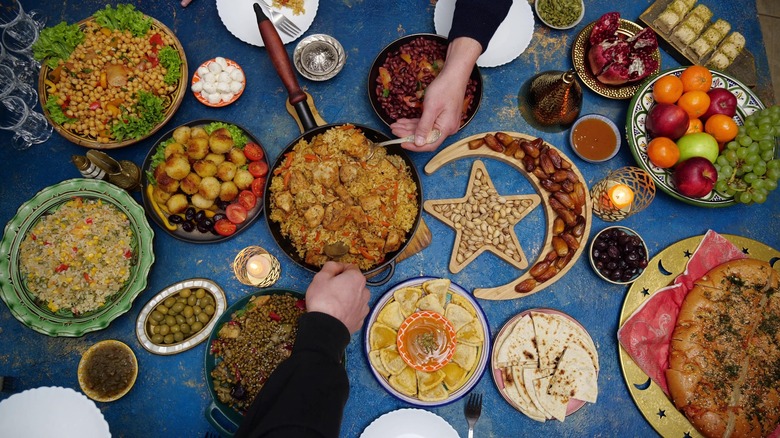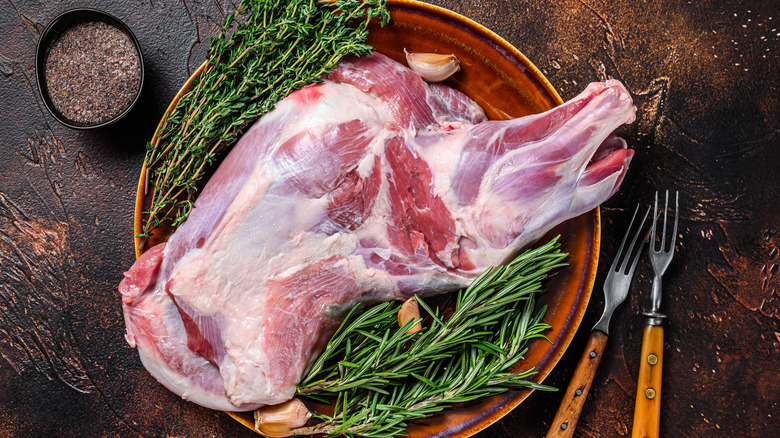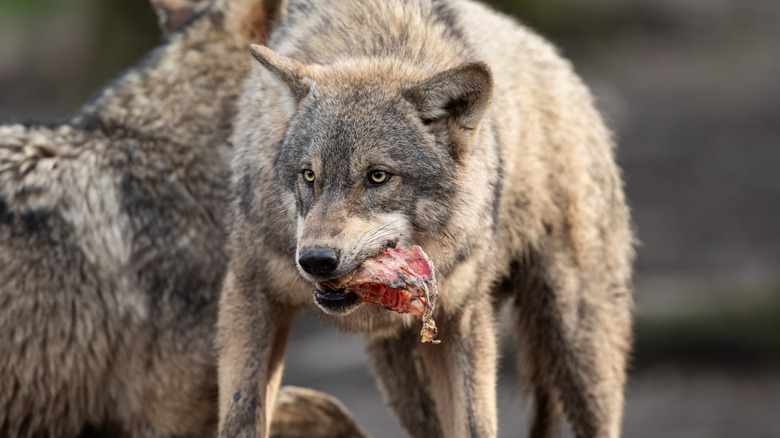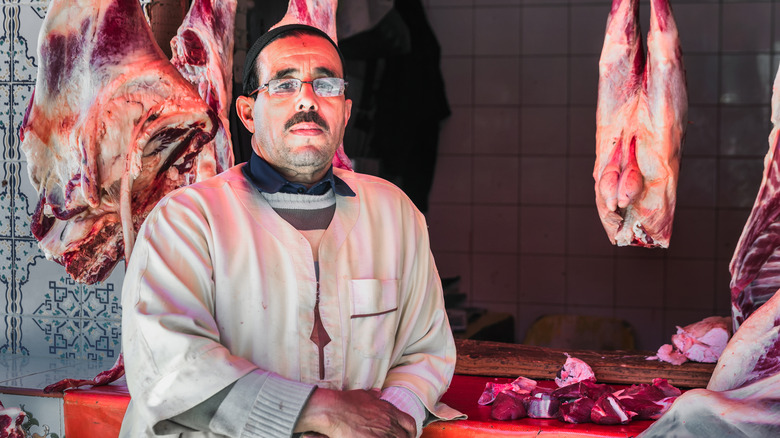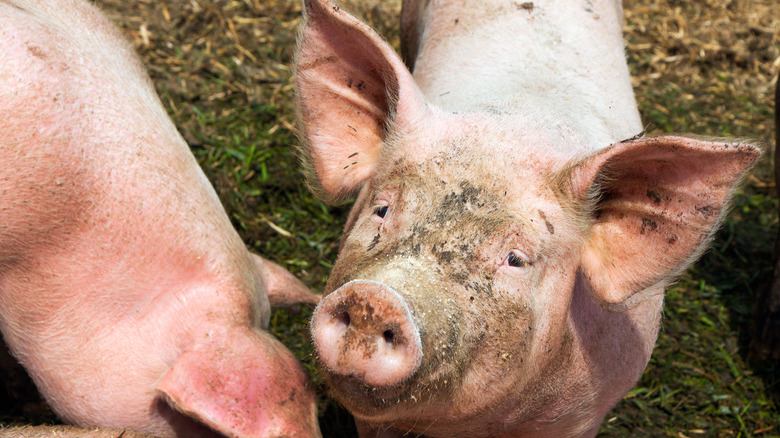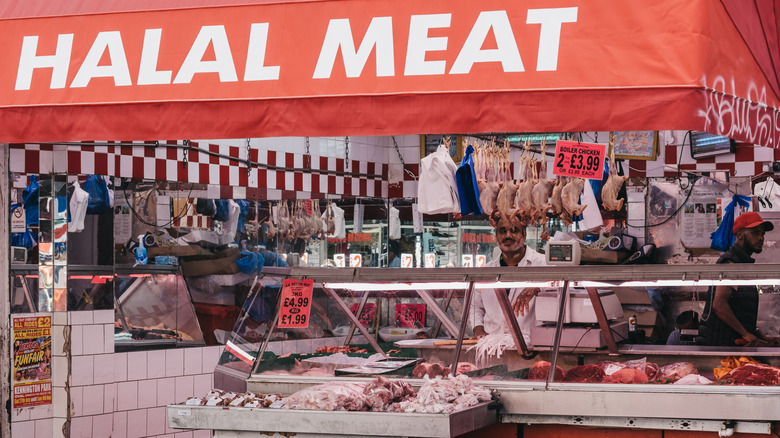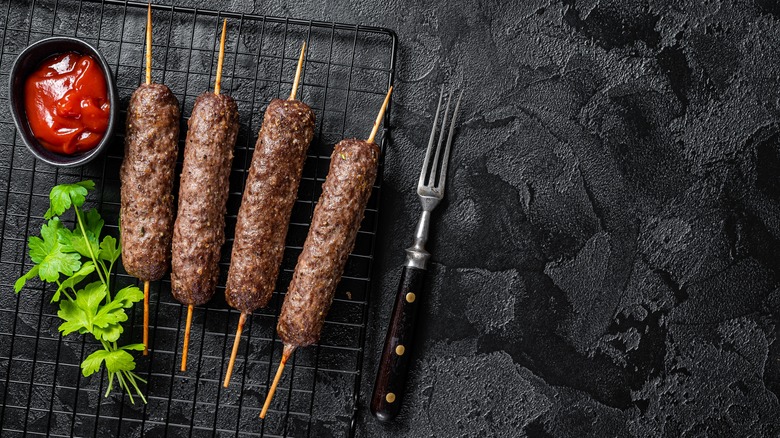A Beginner's Guide To Halal Food
According to the Halal Food Standards Alliance of America, halal is the Arabic word for "permissible" in accordance with Islamic law. Practicing Muslims are expected to follow the laws of halal as outlined in the Quran. Among these are rules pertaining to foods that can or cannot be consumed as per the Hadith, which are considered to be the direct words of the Prophet Muhammad.
While maintaining halal food practices is fundamental to being a devout Muslim, it isn't one of the five pillars of Islam. These pillars are defined by Islamic Relief as Shahada (faith), Salah (prayer), Zakat (almsgiving), Sawm (fasting), and Hajj (pilgrimage). It could be argued that observing what is deemed permissible for consumption fits under the umbrella of Shahada as it's an aspect of expressing unwavering faith to the one God (Allah), but this is not stated outright.
Many people recognize the term halal in contrast to the concept of kosher law, which are similar dietary laws defined by followers of Judaism in accordance with the Torah. As Diffen outlines clearly, while some similarities do exist, they're not identical. Key differences involve restrictions surrounding the consumption of meat with dairy (kosher) and alcohol (halal), variations in which animals can be consumed, and distinct food preparation rituals, such as using different vessels to cook meat and dairy (kosher). Additionally, while both halal and kosher foods have certification organizations ensuring that foods are prepared properly, many foods that are labeled kosher are allowed to be consumed by Muslims as long as they are also considered to be halal.
What is haram?
What is halal is necessarily defined in contrast with what is haram or "unlawful." The American Halal Foundation states that where foods are concerned, "Everything is halal except ABCD IS haram." This is an easy way to remember what is off limits and includes alcohol, blood, carnivorous animals, dead meat, food sacrificed to idols, and swine. All foods that are prepared in accordance with halal laws must be handled in such a way so as to avoid any implement involved in its production from coming into contact with something that is considered to be haram.
The Foundation goes on to define other key terms that are relevant to the discussion of halal food laws. Makrooh — discouraged or detested — encompasses those items that may be potentially harmful to the body, including cigarettes, drugs, and stimulants of any kind. Mash-booh — or suspected — is intended to address those items that cannot be safely classified as either halal or haram and therefore should be avoided. And dhabiha describes meat that has been slaughtered in accordance with the standards established by Arabic law.
Why is alcohol off limits?
As described by the American Halal Foundation, alcohol is considered to be haram or forbidden according to Islamic law. Alcohol also falls under the category of being makrooh or discouraged because it may be harmful to the human body. As such, the consumption of any kind of alcohol — even small quantities used in cooking — is not halal. Green Prophet cites two passages of the Quran of import where alcohol is concerned. In the first, it is expressly forbidden for Muslims to attend prayers while drunk (Quran, 4:43). The second calls intoxicants like alcohol "abominations of Satan's handiwork," which can distract worshipers from engaging in prayer (Quran, 2:219). Both of these point to intoxication as being counter to the second pillar of Islam, which is Salah or prayer.
Sunnah Online expands on this by pointing out that even though there is some mention of the potential benefits of alcohol in the Quran, the hazards outweigh the benefits and therefore strict abstinence is required. Other than inebriation, it is noted that consuming alcohol can create tension between people, be addictive, lead to higher rates of crime, and considered a waste of money. For those who adhere to this abstinence in their earthly lives, the Quran promises a Paradise after death where rivers of milk, wine, and honey that are not intoxicating will flow in abundance. (Quran, 47:15).
How is blood considered not halal?
In the Quran it is stated, "Forbidden to you (for food) are: dead meat, blood, the flesh of swine, and that on which hath been invoked the name of other than Allah," (Quran, 5:3). According to Islam Question and Answer, blood that has poured out of the body of a slaughtered animal is haram and therefore all blood must be drained from the body prior to consumption. It is maintained that blood presents a breeding ground for bacteria and is toxic, even when cooked. Evidence for this that is cited includes the fact that blood is difficult to digest and will often come out in the stool without being absorbed within the gut. While some believe there to be nutritional value to consuming blood, the amount required to provide health benefits exceeds what would be possible to safely consume.
The Halal Products Research Institute goes on to discuss the difficulty of guaranteeing that manufactured food is free of any blood by-products. Blood is used in the production of sausages and stocks, as a thickener for sauces, and for color/flavor in many food items. Hydrolyzed blood plasma is often used as the base for items like surimi – imitation seafood — because of its ability to provide a gelatinous texture. Because it can be an economical and useful food additive and food suppliers are not necessarily required to include its use on food labels, many Muslims are skeptical of packaged foods and therefore avoid them.
The reason carnivorous animals and carrion are not acceptable
While the list of creatures that are considered haram is extensive, two categories that are worthy of mention are carnivorous animals and carrion. The basis of their unacceptability can be traced back to the belief in the toxicity of blood. According to Central Mosque, all animals that hunt and all birds of prey are haram because they have consumed the flesh of other animals and are presumably rendered impure by this fact. Al Islam goes into further detail regarding carrion, noting that it is haram because it was not slaughtered according to Islamic law and therefore its blood was not properly drained and likely contaminating the flesh of the animal. Additionally, it is mentioned that hunting is only allowed if the meat is used for food. Hunting for sport is strictly prohibited.
Of further note is that all sea creatures (except scaly fish), all pests (such as rats), and animals that have utility (such as horses and donkeys) are haram. And foods that appear to have consumed something impure, even if they are otherwise halal, are considered makrooh or detested. Finally, milk and eggs can only be eaten if the animal from which they came is halal, such as cow's milk or chicken eggs.
How meat is slaughtered according to Islamic rules
According to We Halal, the fundamental underlying tenet of halal meat is that the animal is a creature with a soul and therefore must be treated with respect throughout its life cycle. Halal animals must be pastured, fed an all-natural vegetarian diet, and not be given hormones or antibiotics. The meat is considered zabiha, or permissible to consume, if it has been slaughtered according to Islamic law.
The process of slaughter is meticulously outlined by the Department of Halal Certification EU. First, the animal must be alive and well — fed, given water, and kept calm — at the time of slaughter. A freshly sharpened knife must be used and the animal should be slain with one swift cut to the throat severing the esophagus and two jugular veins. The slaughter must be performed by a Muslim adult while invoking the name of Allah with the statement, "In the Name of Allah; Allah is the Greatest." Once it's determined that the animal is dead, it must be drained of all blood before it can be processed for consumption.
As stated by the Halal Food Standards Alliance of America, the use of stunning is frowned upon as a general rule. However, if the animal appears to be anxious, a low-grade shock may be applied to relax it. This practice is controversial because there's no way to know if the animal is experiencing pain. Only reversible forms of stunning can be utilized; irreversible forms that lead to the death of the animal are forbidden.
Food sacrificed to idols and not Allah are not halal
Islam and Quran cites the following passage as indicative of the rules regarding invoking the name of Allah upon animals that are slaughtered: "Do not eat of (animals) over which Allah's name is not pronounced as a deliberate sin. Certainly, the strayed ones incite their allies to strive against you. If you obey them, you surely become polytheists." (Quran, 6:121)
This particular law has become a serious point of contention particularly in Western cultures as Muslims have turned to more modern mechanized means of slaughtering meat. The Halal Food Standards Alliance of America describes that in mechanized poultry slaughtering facilities, there are three ways of ensuring that this rule is followed. First, a Muslim will say the prayer when starting the machine. Second, a Muslim who isn't operating the machine will stand by saying the prayer for each animal slaughtered. And finally, a recording may be played of someone reciting the prayer during slaughtering.
The validity of these methods as fulfilling halal rules of slaughter are questionable and subject to individual interpretation. If one goes by the guidance that the slaughterer themself must say the prayer, the fact that the machine is the one killing the animal renders any mechanical process in violation of Islamic law. If the law is more loosely translated to accommodate the machinery, there's still the issue of the volume of animals that are processed in a short time period. There's no way that the full prayer can be administered each animal slaughtered. It's a conundrum that requires concessions to be made to facilitate more economical and effective means of halal food production to supply an increasing demand for halal meat.
Pork is banned
According to Al Qalam, the consumption of pork is forbidden in four distinct verses of the Quran. It is considered to be the most unclean animal on the planet because it will consume anything and often lives in unhealthy conditions surrounded by its own feces. Pork harbors a number of microorganisms that can cause severe illness if it is not prepared properly and it is thought to be one of the least healthy options in terms of cardiovascular health. Halal Haram continues that pork is particularly toxic because pigs do not sweat, thereby trapping toxins in their flesh.
My Islam uses the fact that the Old Testament of the Bible also outlaws the consumption of pork as further justification that eating pork is problematic. It also references two modern scientific articles outlining the continued research on the health consequences of eating pork, which include the risk of cancer, Hepatitis E, multiple sclerosis, and swine flu. And it is noted that the consumption of pig is equated with another practice considered to be haram — gambling. This analogy simply strengthens the argument that consuming pig is strictly and unequivocally against Islamic law.
Is it necessary for food to be certified halal to be safe to consume?
While it is not necessary for a food to be certified halal for it to be safe to consume under Islamic law, certification can provide consumer confidence. The Halal Research Council suggests that with an ever-growing population of those choosing to consume foods that are halal, there is growing concern regarding the consistency of standards being upheld throughout every step of food production and across a wide range of products from meat and dairy to cosmetics. Organizations like Halal Food Council USA have been recognized internationally as both credible and reliable.
Easy-to-identify symbols like those utilized by Islamic Services of America enable consumers to quickly know which items are halal versus haram. Because food labeling is inconsistent across the globe, having the peace of mind that what you are consuming has been inspected by one of these organizations can help take the guesswork out of eating halal. And those companies who can afford certification may have a leg up in terms of standing out in a competitive market.
How accessible are halal foods?
Due to the increasing number of individuals choosing to eat halal — both of Muslim and non-Muslim persuasion — the demand for halal food has skyrocketed. With that demand, the issue of halal fraud has become widespread in both predominantly Muslim countries and more particularly in majority non-Muslim countries. Salaam Gateway points to several recent scandals as indicative of a growing problem with the regulation of halal foods. Generally speaking, majority non-Muslim countries don't have regulations in place to monitor the production and processing of halal food, specifically whether or not meat is slaughtered according to halal standards. Majority Muslim countries do have regulations in place, however, even in these countries, corruption is rampant and non-halal meat has been discovered.
As AlJazeera notes, the vast majority of halal meat being consumed globally is being produced in non-Muslim countries with Brasil, Australia, and India being the top three distributors. The $415 billion dollar industry is big business and countries like Saudi Arabia, Malaysia, UAE, and Indonesia rely upon the honesty of these sources to distribute meat that has been processed properly. Salaam Gateway continues that since there is no international enforcement agency regulating imported meat, it's up to each country to develop methods that can be utilized to inspect quality. Researchers at Michigan State University are conducting studies to determine the need and consumer desire for increased fraud prevention measures.
How halal can be considered early public health
While the Islamic faith dates back to an era before there was language for or even science to regulate public health, the detailed health-focused guidelines outlined in the Quran certainly encapsulate a very early version of a health code. The Journal of the British Islamic Medical Association highlights the specificity with which virtually every aspect of human health from sanitation to prevention of illness is addressed by Islamic law. The codification of what, when, and how to prepare food and consume it to remain healthy within religious dogma may very well be the most effective way of ensuring that these prescriptions are followed.
As Halal Watch World states, every major world religion specifies rules regarding food safety. This reinforces the notion that adhering to maintaining one's health as being integral to one's connection to the divine is a powerful tool in fostering continued faithful observation of said behaviors. The threat that what you do in life influences what happens to you after death is one that cannot be taken lightly and may be far greater motivation to upholding food safety standards than what science alone can provide.
What countries adhere to halal rules?
While there may be a perception that the largest Muslim population resides in the Middle East, statistically speaking this isn't accurate. The American Halal Foundation notes that Islam is the fastest-growing religion in the world. It is estimated that by 2030, 30% of the world's population will be Muslim and many of those identifying as Muslim will live outside of the Middle East. In fact, 63% of the world's Muslim population currently lives in the Asian Pacific, with Indonesia and Malaysia representing 55% of that total.
Even though the global halal market is made up of five distinct regions including Asia Pacific, Middle East and Africa, Europe, North America, and Latin America, it is projected that the greatest potential for growth in the industry is within the United States. This is partly due to the expansion of the Muslim community in the U.S., but it also indicates a growing interest in alternative belief systems and foodways.
Is there a potential health benefit to consuming halal meat?
Many non-Muslims are turning to consuming halal meat because of the perception that it is healthier for you than conventionally raised and slaughtered meat. As per Boxed Halal, animals that are raised halal are never given antibiotics or hormones, are pastured, and are fed a vegetarian diet making the meat rich in omega-3 fatty acids. Halal meat also lacks blood, which contains lactic acid and can adversely influence the taste of the meat.
Halal Food Council USA goes on to note that because only healthy, happy animals are fit for slaughter, there is less of a chance of the meat becoming contaminated by disease. Additionally, because the halal slaughtering process is intended to be as quick and painless as possible, the animals are less likely to produce adrenaline at the time of slaughter, which may improve the flavor of the meat. Ultimately, the choice to eat halal meat may be as much about the perception that it is more ethical in terms of the animals being raised humanely as it is about the potential health benefit of the meat.
